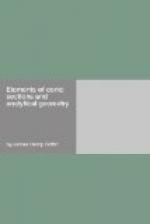Especially she was Leslie Goldthwaite’s delight. Leslie had no sisters, and her aunts were old,—far older than her mother; on her father’s side, a broken and scattered family had left few ties for her; next to her mother, and even closer, in some young sympathies, she clung to Cousin Delight.
With this diversion, we will go back now to her, and to her thought.
“I was thinking,” she said, with that intent look in her eyes, “I often think, of how something else was found, once, having nothing but leaves; and of what came to it.”
“I know,” answered Leslie, with an evasive quickness, and turned round with her watering-pot to her plants again.
There was sometimes a bit of waywardness about Leslie Goldthwaite; there was a fitfulness of frankness and reserve. She was eager for truth; yet now and then she would thrust it aside. She said that “nobody liked a nicely pointed moral better than she did; only she would just as lief it shouldn’t be pointed at her.” The fact was, she was in that sensitive state in which many a young girl finds herself, when she begins to ask and to weigh with herself the great questions of life, and shrinks shyly from the open mention of the very thing she longs more fully to apprehend.
Cousin Delight took no notice; it is perhaps likely that she understood sufficiently well for that. She turned toward the table by which she sat, and pulled toward her a heavy Atlas that lay open at the map of Connecticut. Beside it was Lippincott’s Gazetteer,—open, also.
“Traveling, Leslie?”
“Yes. I’ve been a charming journey this morning, before you came. I wonder if I ever shall travel, in reality. I’ve done a monstrous deal of it with maps and gazetteers.”
“This hasn’t been one of the stereotyped tours, it seems.”




